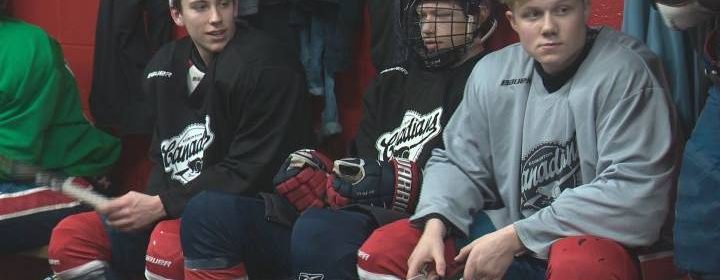St. Albert hockey player battling PTSD to stay in the game he loves

Ethan McKinley was only 12 years old when his life was changed.
It’s a story he can usually only tell once a year, but he bravely sat down with Global Edmonton.
He was on his scooter headed home for dinner after being at a friend’s house when a man in a truck approached him and asked him if he had seen his black Labrador dog.
“I was at the top of a hill, like right where a path goes behind into a ravine area,” Ethan, now 17, recalled. “I looked down the hill, turned around and said, ‘Nope’ and he was right there and he grabbed me.
“I was kicking, screaming, yelling, trying to get some help. He ended up putting me in the back of his truck.”
Enough people heard the screams that Ethan was rescued, but not before he was physically and verbally assaulted by the man. To this day, the McKinleys don’t know exactly how long he was in the truck.
“It’s what you never ever would imagine happen to your child,” said his mom, Rachel McKinley.
After the incident she remembers vowing that she wouldn’t let this change her family. In the first few months, it seemed possible. But as they’ve learned about post-traumatic stress disorder, it can come on quickly and without warning.
“I couldn’t leave the house,” Ethan said. “I wasn’t eating, drinking, doing anything at all.”
“[He] didn’t go to school for almost three years,” Rachel said. “In part because of his autoimmune condition, in part because of PTSD, it got very complicated.”
The autoimmune condition is called PANDAS. When it flares up, antibodies attack part of his brain, which can make the panic worse.
“He would cry desperately because he couldn’t do the things he wanted to do,” Rachel said. “He would say to me, ‘Mom, I don’t care how hard it is, get me in the car and get me to that rink; I just want to skate.’”
So his family would try to get him there, starting three hours before practice. The panic would overwhelm him; Ethan has what’s called the freeze response.
“He’d feel the panic that you think you’re gonna feel: the nauseous, the headache, the sweats,” Rachel said. “But then he would pass out. Sometimes it was hours before we’d get him off the floor.”
Ethan McKinley and his family: dad Mark, mom Rachel and sisters Ainsley and Sophie.
Ethan McKinley and sisters Ainsley and Sophie.
Ethan McKinley and his family: dad Mark, mom Rachel and sisters Ainsley and Sophie.
He kept fighting desperately to get over the PTSD. He finally got back in to the game, but it was going to continue to be a tough battle as the McKinley family learned there’s still a stigma surrounding mental health.
Ethan would miss practice, team events and school because of his mental illness.
“We’d manage to, as a big win that might take us six hours, we’d get him to the rink to watch his cousin’s game for example,” Rachel said. “People would judge, ‘Well, I don’t understand why he’s not at school yet, you’re letting him come watch his cousin’s game.’
“Well we weren’t letting him, we were working our butts off to get him out of the house and in the car to do something he loved.”
Rachel said he had coaches who would bench him for missing practice; teammates would text Ethan wondering where he was, even though they knew why he missed a skate.
That was until this year when he suited up for the midget AAA Canadian Athletic Club Gregg Distributors.
It was early this season when an opposing player referenced Ethan’s attempted abduction. Of course, that is a trigger for the 17-year-old defenceman. He managed to finish the game but was overwhelmed in the dressing room afterwards.
After his panic attack subsided, his mom encouraged him to tell his teammates his story. He cried when he recounted that day. It’s certainly not an easy thing to do, but what this team did has probably changed the McKinley family for the better.
“I’m told that there were several boys who got up walked across the room put their arm around him,” said Rachel, who added a number of players walked him to his car and one teammate even followed him home to make sure he got there safe.
“A couple of them sent me texts after asking if I was okay,” Ethan said. “I know that they all understand. They all reacted pretty well, like, they were there for me.”
The head coach is Tony Orsini. He’s in his second year with the high level minor hockey team and from day one he’s tried to create a positive culture. The rink is a place to escape life’s daily stresses and struggles.
Orsini has done research and is trying to learn as much as he can about PTSD and how to help Ethan.
“For me it’s just about giving a kid a chance,” said Orsini. “He’s got lots of skill, he’s good enough to play at this level, he just has other factors in his life. So we’re working with him and we’re 100 per cent on board in supporting him all the way through.”
“Knowing that I can go to any one of them and talk to them, it’s really helped,” said Ethan.
The St. Albert kid will use all that support as he continues to fight the long battle against PTSD.
“Just think of it day-by-day, hour-by-hour, just keep fighting and just think that it will always be better one day.”
Source: Read Full Article


